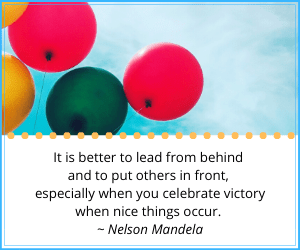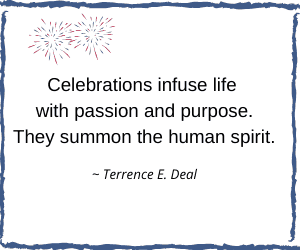Celebrating success with employees is an important part maintaining positive morale within an organization. But the BEST leaders know that it consists of:
- recognizing the individual’s success
- recognizing the group
What IS celebration?
“The celebration of something is praise and appreciation which is given to it.”(1)

Celebrating is: rewarding. It’s the act by a leader of showing that success is recognized. But it doesn’t just have to do with success. Celebrating can just be about positively recognizing a person or event. It’s a time to be joyful.
From a personal standpoint, we’ve all experienced either a time when we’ve accomplished something and felt discouraged that it wasn’t observed (or maybe it was observed, but not recognized in some way), or a time when we’ve felt very positive because our work was given some type of genuine recognition.
Celebrating breeds optimism, self-esteem and promotes relaxation. It increases positive feelings a person has about themselves and their organization.

There’s science behind it…
Dopamine, a pleasure-inducing chemical, is released by the brain in employees when they are recognized. The Gallup organization states that, “The chemical not only makes healthy employees feel good when they get praise, it is also crucial to memory and learning. It creates an internal reward system that makes employees want to repeat behavior that the company needs — if doing the right thing earns them recognition.” (2)
A social psychologist at Loyola University Chicago, Fred Bryant, suggests that we not only celebrate but that we do this mindfully, in full-recognition of the feelings accompanying the celebrations. He says that being aware of how you feel during positive events can increase happiness at that moment and also increase happiness longer-term. (4)
Want more statistics on celebrating at work?
Recent statistics focusing solely on celebrating the years of service of employees found that:
81% of employees state that celebrating an associate’s career milestones helps them feel appreciated.
When years of service awards are given by leadership there’s an uptick of 35% of employees actually feeling like they have a sense of belonging in their company (3)
The Gallup organization reports some additional statistics regarding recognizing employees:
- Only 1 out of 3 employees state that they’ve been positively recognized for work that they’ve done over the past 7 days
- Employees polled state that, if not adequately recognized, they are two times more likely to quit their job in search of a better work environment over the next year
- Recognition (or giving some type of award) in a public celebration was the most meaningful, based on their study
- The most meaningful recognition came from their direct supervisor, followed by the CEO or other higher-level company representative

(Gallup; “Employee Recognition: Low Cost, High Impact”)
If a leader is recognizing an individual’s performance, a public celebration shows peers what success looks like, encouraging this type of performance in others.
Group celebrations for either recognizing an individual or the group’s performance, gives everyone a sense of unity—a sense that they are part of a close-knit team. These positive results can actually help create a stronger company culture.
Celebrating Induces Gratitude
Getting back to science, celebrating both the individual’s performance and group’s performance induces feelings of gratitude in everyone involved. Studies have shown that gratitude can significantly affect individuals’ physiological well-being, and can then also affect how they react to other members of the work team, creating a positive cycle.
“Thankfulness is the beginning of gratitude. Gratitude is the completion of thankfulness. Thankfulness may consist merely of words. Gratitude is shown in acts.”
Henri Frederic Amiel
Effects on the Individual
According to Positive Psychology, feelings of gratitude can lead an individual to have:
- More overall satisfaction with life
- Better sleep
- Greater ability to be resilient
- Potentially more patient
- Less cellular inflammation
- Less likelihood to experience burnout
Effects on the Team
This same article suggests that groups who experience gratitude may have, among other benefits:
- An uptick in socially-promoting behaviors
- Stronger relationships
- Increased effectiveness within the group
- Increased job satisfaction
Other Benefits of Group Celebrations within an Organization:
- Team celebrations enable individuals to focus on something positive, providing an escape from either stressful tasks, or those that might be mundane. Often, they provide a couple moments of spontaneous fun.
- Team celebrations employees to share positive feelings in a unified way with other members of their team
Examples are only limited by the imagination, but there are a couple of things to keep in mind…
- Celebrating employees isn’t a one-size-fits-all. It’s important for the leader to understand the significance of what motivates each individual. While genuine praise can almost never be overdone, some people just don’t like to be the focus of a group’s attention. (Is the individual more likely to appreciate a hand-written card? Would they prefer to be recognized in front of their department or of the entire organization?)
- If the celebration is in recognition of an individual or several individuals, the celebration should be directly in line with the company’s purpose, brand and culture or risk coming across as insincere
- Any form of recognition – of an individual or of the group – must be timely and genuine. (We’ve all known leaders who attempt to provide some type of staff appreciation and fall miserably short in making everyone feel appreciated, right?) Recognition is always best if it calls out specific successes, possibly also mentioning specific positive results. General praise can also be appreciated, but won’t be nearly as effective with lasting results as praise of specific performance with created specific positive results.
- Who is leading the celebration, and their relationship to individuals on the team can also affect the outcome.
Examples of Celebrating Both the Individual and Group
For the Individual:
- A hand-written card specifying accomplishment and gratitude from the leader
- An individual offer for the leader to treat the team member to lunch
- A letter of commendation sent to the leader’s boss (or higher leader in the company), with the individual being recognized receiving a copy
- A gift card presented to the employee being recognized in front of the entire team
- Verbal recognition of the individual at a company-wide event
- Verbal recognition at department meeting with an offer to leave early
- Movie tickets presented to the individual for use by their family for a fun family outing
For the Team:
- A celebratory breakfast or lunch brought in by the leader or catered
- An outing for a team lunch to celebrate a success
- A sweet treat brought in with a short gathering to promote successes
- A work-related off-site event
- An off-site social event solely to have fun and reward participants
- An in-office chair massage for those wanting to participate
- A public “thank you” and an offer to leave the office early
The list could go on and on…
There’s no doubt that celebrating successes of both individuals and the group as a whole provides both short-term and long-term benefits to both. It can also have a trickle up effect, with the leader and the rest of the organization experiencing benefits from it, as well. But rewarding team members often gets forgotten; focus on the tasks that are in place to get to the end result can get in the way.
Additional Question:
Should special days for individuals be celebrated at work?
Why the heck not? Individual celebrations are special for… the individual being celebrated. Birthdays, anniversaries, retirements, or other special events unique to an individual can be celebrated in a way that brings a group together but singles out an individual in a positive way.
Of course, this should be done equitably across the group. But, who doesn’t love a few moments of specialized attention for either something they’ve done, or a special day?
What can you do to make celebrating with your team members an integral part of your leadership strategy?
What are your thoughts on celebrating? If you have a unique, effective way of celebrating with your team, we’d love to hear from you!
Sources:
(2) Gallup: “The Fourth Element of Great Managing”
(3) O.C. Tanner

